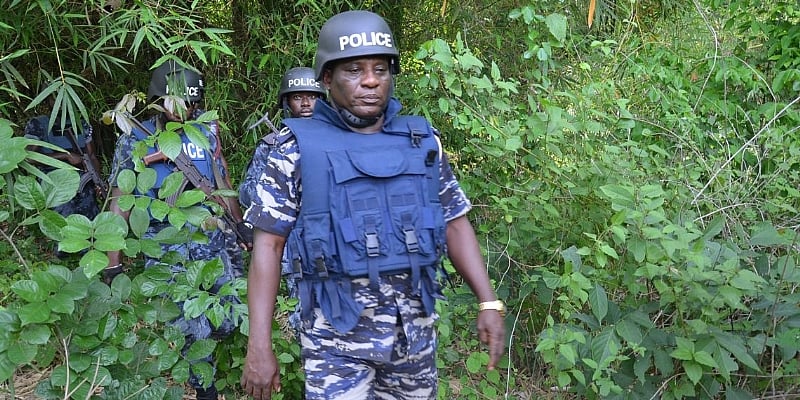The escalating violence in Bawku, a town nestled in the Upper East Region of Ghana, has prompted a high-level intervention led by the Inspector-General of Police (IGP), Mr. Christian Tetteh Yohuno. Accompanied by a delegation of seasoned police personnel specializing in operations, investigations, and intelligence, the IGP’s visit aims to address the volatile security situation that has gripped the town following a series of violent clashes between security forces and local youth. The immediate trigger for the current unrest is the death of a young man, Fuseini Iddrisu, allegedly at the hands of the police. This incident ignited public outrage and sparked a chain of events that plunged Bawku further into turmoil. The IGP’s mission includes expressing condolences to the bereaved family, visiting the injured, including a police officer and an immigration officer, and extending support to officers who suffered property damage during the unrest.
The recent violence in Bawku paints a disturbing picture of escalating tensions and retaliatory actions. Following a deadly clash between police and local youth that resulted in Iddrisu’s death and several injuries, security forces, comprising the Ghana Police Service and the Ghana Armed Forces, managed to temporarily restore order on April 9, 2025. However, this fragile peace was shattered the following day when, fueled by anger over Iddrisu’s death, a mob of youth reportedly attacked the residence of the area’s Member of Parliament, Mahama Ayariga, in the Wiidi suburb of Bawku. The attack, which began with stone-throwing that damaged windows and other parts of the property, escalated into arson early the next day. This incident underscores the volatile nature of the situation and the deep-seated grievances fueling the unrest.
The IGP’s visit to Bawku is not merely a fact-finding mission; it represents a crucial step towards de-escalating tensions and restoring lasting peace in the troubled town. His presence signals the government’s commitment to addressing the root causes of the conflict and ensuring the safety and security of all residents. Beyond offering condolences and support, the IGP and his team are tasked with engaging with various stakeholders, including traditional rulers, community leaders, and other influential figures. This collaborative approach aims to foster dialogue, build trust, and pave the way for a more peaceful future for Bawku. The inclusion of operations, investigations, and intelligence personnel in the delegation underscores the commitment to a comprehensive and multi-faceted approach to resolving the crisis.
The unrest in Bawku highlights the complex interplay of factors contributing to the volatile situation. While the alleged police killing of Iddrisu served as the immediate catalyst, the underlying causes likely run deeper. Socio-economic grievances, political tensions, and historical conflicts may all play a role in fueling the cycle of violence. Understanding these complex dynamics is crucial for developing effective strategies to address the root causes of the conflict and prevent future outbreaks. The Ghana Police Service, in its official statement, recognized the need for a collaborative approach, pledging to work with all stakeholders to ensure sustained peace and order in Bawku. This includes not only security measures but also efforts to address the underlying socio-economic and political factors that contribute to instability.
The arson attack on MP Ayariga’s residence further complicates the situation, adding another layer of complexity to the already volatile environment. This incident not only demonstrates the extent of public anger but also raises concerns about the targeting of political figures. It underscores the importance of addressing the underlying grievances that drive such acts of violence and ensuring the safety and security of all residents, regardless of their political affiliation. The police investigations into the incident will be critical in identifying the perpetrators and bringing them to justice, sending a clear message that violence will not be tolerated.
The future of Bawku hinges on the success of the ongoing efforts to restore peace and stability. The IGP’s visit, coupled with the commitment of the Ghana Police Service and the Ghana Armed Forces to work with community leaders and other stakeholders, offers a glimmer of hope. However, lasting peace will require a sustained commitment to addressing the underlying causes of the conflict, fostering dialogue, and building trust among all parties involved. The challenge lies not only in restoring order but also in creating an environment where such violent outbreaks are less likely to occur in the future. This requires a holistic approach that addresses both the immediate security concerns and the long-term development needs of the community.


